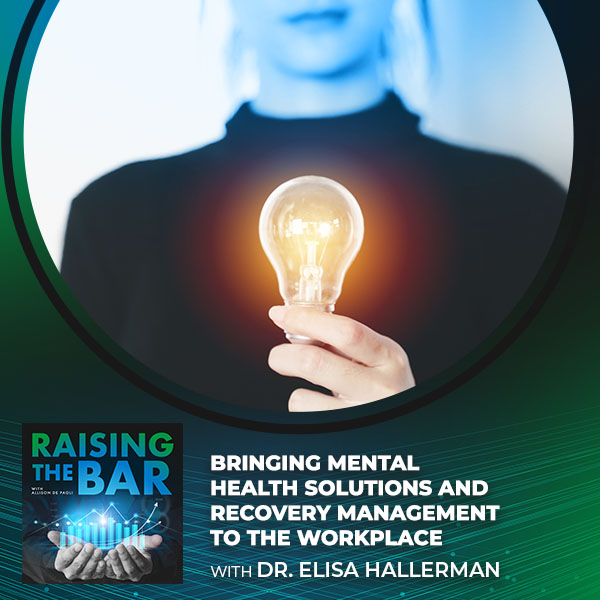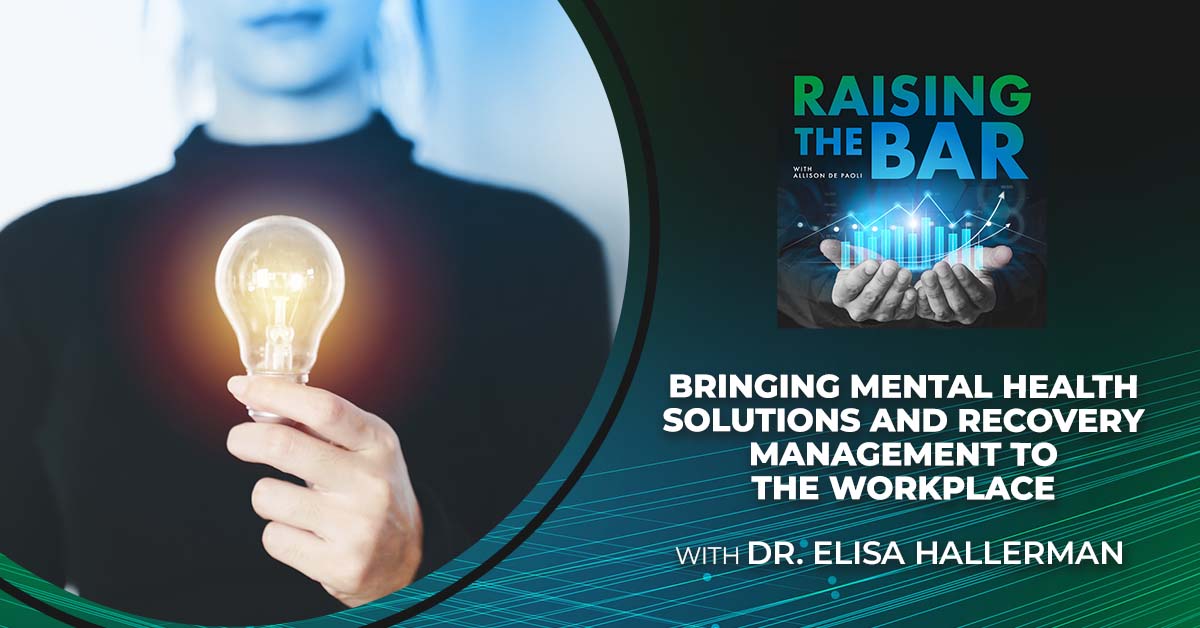
The effects of trauma are lifelong, and it manifests not only in the personal lives of those affected, but in their professional lives as well. But mental health conversations are far from normalized in the workplace. Not many people are working with company executives to make sure that their employees are thriving mentally at work. This is what Dr. Elisa Hallerman is passionate about. Early on, Dr. Hallerman left her law career to pursue a different path. She found herself in the middle of the entertainment business but soon found herself still lacking in direction. That was when she decided to go back to school to become a doctor of psychology. Dr. Hallerman specializes in mental health and recovery management for both individuals and companies. Her personal experience with trauma, addiction, and recovery gives her such a deep insight into a problem that is so pervasive yet hitherto underserved. Tune in to this episode and discover how she makes her service possible even when working with companies that have thousands of employees.
—
Watch the episode here
Listen to the podcast here
Bringing Mental Health Solutions And Recovery Management To The Workplace With Dr. Elisa Hallerman
In this episode, it is my pleasure to introduce you to Dr. Elisa Hallerman who is not our typical business owner guest. She runs a rather unique organization and has a rather unique history. You know I’m not one for bios, but I’m going to ask her to fully introduce herself and what she does to us. Thank you for joining me, Elisa.
Thank you so much for having me, Allison. I was a practicing attorney at one point many years ago. After college, I went straight to law school practice and did a lot of litigation, personal injury, and real estate. I did that for about two years and decided this wasn’t for me. I don’t want to be running around to all the five boroughs in Manhattan and around New York City. I don’t want to live in New York City, it’s too cold. I don’t want to marry this guy that I’m living with. Get me out of here. I moved to LA.
This was in the mid-‘90s, in the old days before the internet. I got to Los Angeles, and someone introduced me to the entertainment world and said, “Do you want to get a job at a talent agency?” I did that. I got a job at a talent agency, and I started in the mail room as an assistant, even though I was an attorney. I was able to work my way up over the next fifteen years to a partner and ran one of the talent departments at one of the largest agencies. I had this big beautiful career.
I’d gotten sober from drugs and alcohol in 2002. After I’d gotten sober, I had a lot of “success” in the entertainment industry. I say “success” because, at the time, success meant to me more of the shiny new stuff outside of myself. The corner office, the title, the house, the car, whatever those things were that I had hoped and dreamed for, and whatever more business looked like.
What started to happen is the longer that I was sober and the healthier I was getting, my outsides weren’t matching up with my insides. I hadn’t done that deeper internal work. I didn’t do it because I didn’t know how to do it. People would sometimes say, “You need to do the inner work.” I was like, “How do you get inside?” I was a businesswoman, a lawyer, and an intellectual thinker. To me, doing the inside work felt a little esoteric, and I didn’t know my way in.
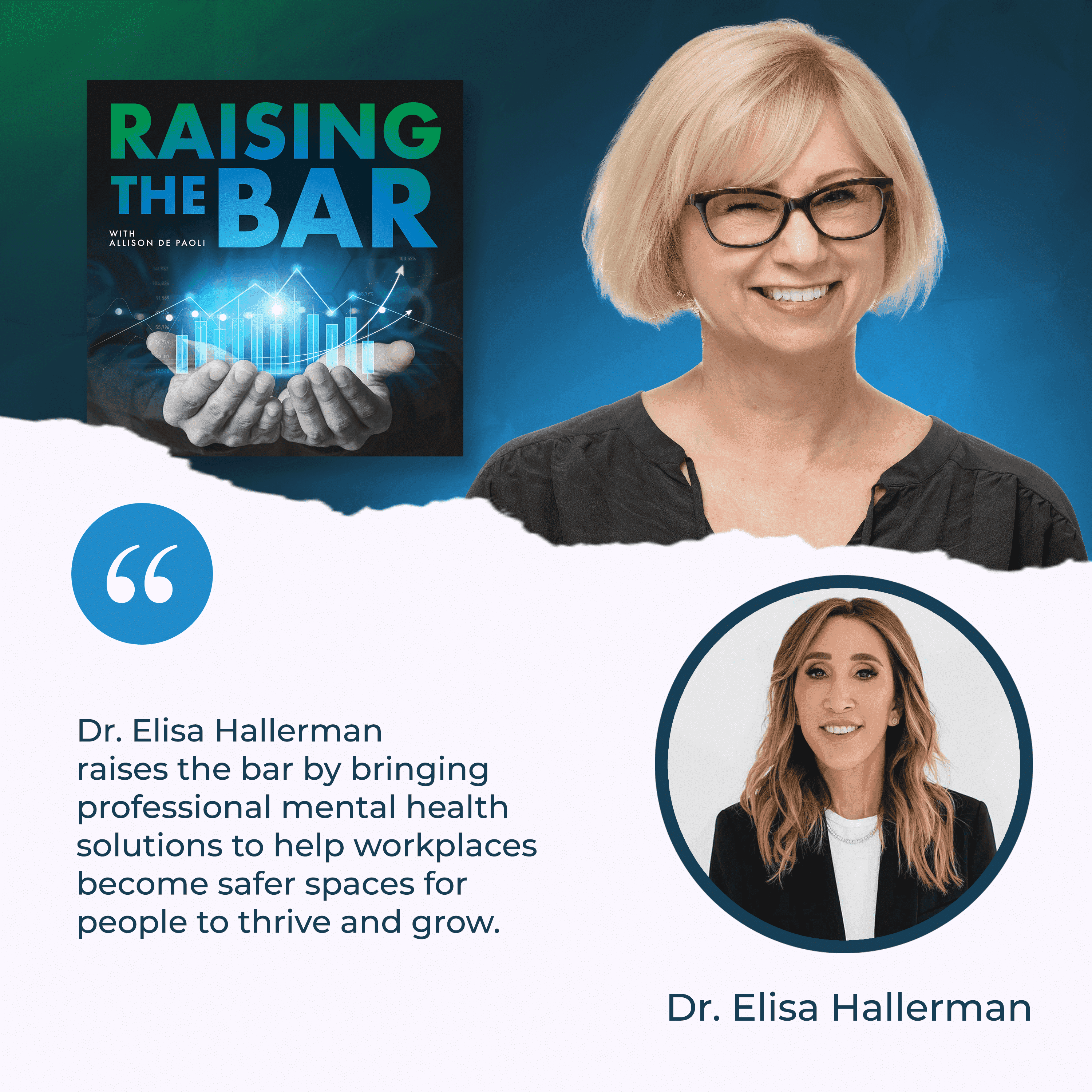
When you start to get confronted with these little whispers in your life, “Is this it? Is this what I’m doing? Am I happy? Do I like my job?” I’m finding more people are having these whispers, especially after what we’ve experienced with lockdown, COVID, and the pandemic, that I had to listen to that. That was a couple of years ago to say to myself, “What else is out there?”
Did you find that you didn’t listen to the whispers until they shouted at you or hit you over the head?
Yes. I feel like maybe most people can understand that we hear these whispers, but they’re such big questions. If we’re going through our day-to-day life and things are okay enough, we feel like we can shush them away. We do that until they get louder. I refer to them as soul whispers when I talk about the soul journey in the book. They’ll get louder until a brick house falls on your head, and you’re forced to stand still and evaluate.
[bctt tweet=”Your soul whispers will get louder until a brick house falls on your head and you’re forced to stand still and evaluate.” username=””]
When I started to hear the whispers louder, I was confronting brick walls, large speed bumps, and big moves that I needed to pivot. There was a lot of change that was going on for me. For me, I think the defining moment was one of my biggest clients fired me. While I still had this great big job, what it did was it caused me to have some time to think and to feel my reaction, which was, in a lot of ways, I was relieved. I felt like I had this more space to look at myself. That’s when I started going back to school and taking classes at night. I started learning about addiction, addiction medicine, neuroscience, and trauma.
I was blown away by the amount of information. When I got sober, I had a therapist, and I was part of Twelve-Step. I didn’t understand the breadth of what was out there as far as treatment, modalities, science, and new information every day, especially as it related to neuroscience. I started to think this is a big missing piece.
When I was an attorney, people would come to me for legal advice. When I was an agent, people would come to me for career advice. I thought, “Why isn’t there someone or a company where you can go to and get advice like you would get from your accountant on your taxes when you have a mental health issue? You just want to be able to say, “Here’s what’s going on with me, now what? What exists? What don’t I know?”
As we google or we ask our neighbor or our best friend where their kid went or their best therapist, it’s not always going to fit in exactly with our own unique experiences. That felt like a business I wanted to create. I went back to school and got my Master’s and Doctorate in Psychology, focusing on neuroscience and trauma along with the addiction studies that I had already done. I then started this company of recovering management agency based off the blueprint of how I ran the talent department.
It’s such a good illustration of learning one skill and applying it to another place which I think is maybe not easier but possible more often than people think where you learn this, but you can pivot this over here, and it’s the same skillset. I want to go back and talk about neuroscience and trauma a little bit. I live in South Texas. Besides the fact that we think we’re our own country here, we are a little bit different.
We tend to think, “Tough it out. Stick it out. Tough it up. You can do it.” There has been so much research and new material in psychology on when and how trauma affects people and understanding that the effects of trauma can be lifelong. That lands in employer workplaces. I will tell you, I don’t have a client that’s not having a mental health challenge. Not the white collars, not the scientists, not the lawyers, not the nurses, not the manufacturing folks, not the car folks. Nobody.
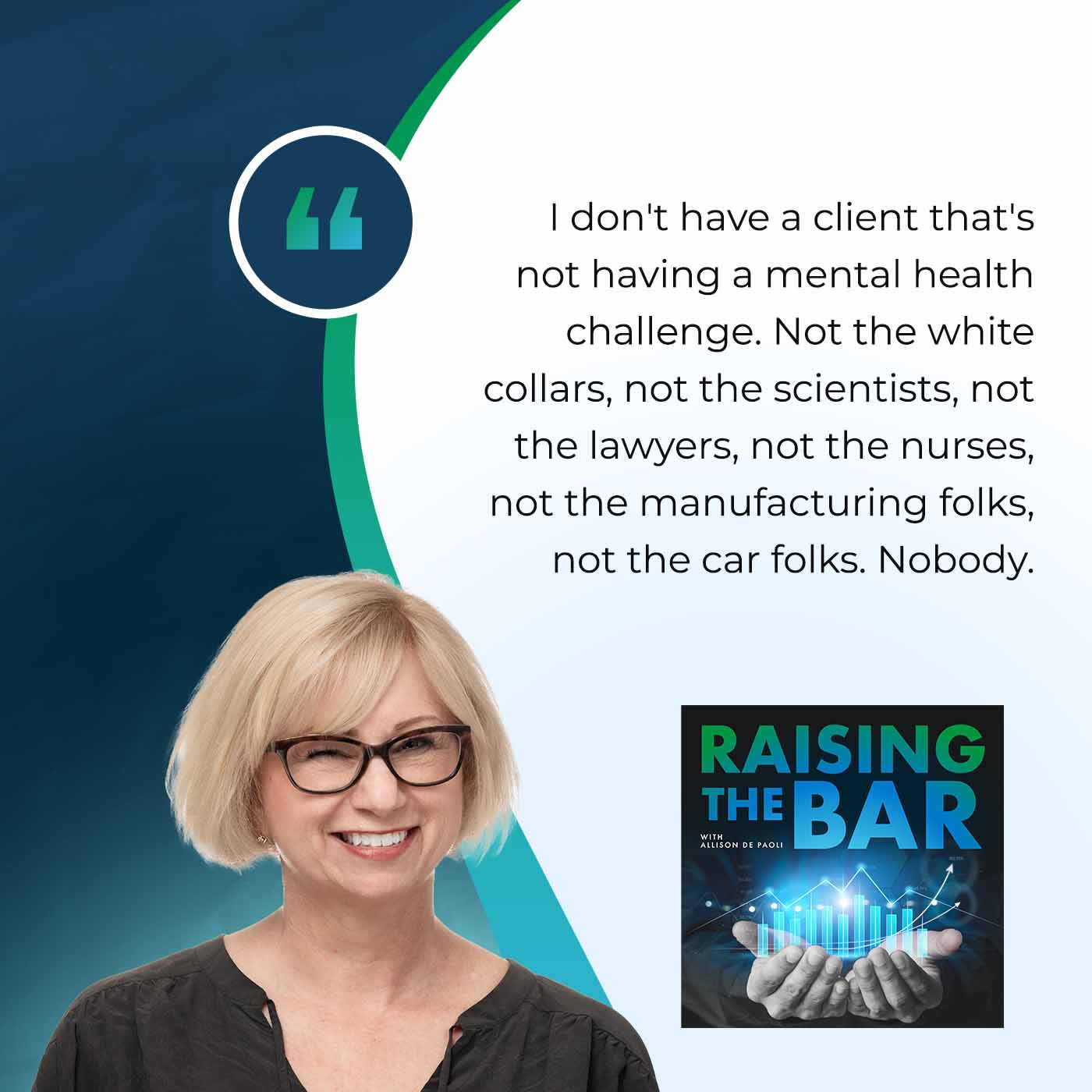
Employers in blue-collar industries are saying, “We have a mental health problem. We need to help people manage themselves or understand how to manage themselves. We need to interact with them better.” In South Texas, it’s remarkable to me. It is truly remarkable. You work not just with individuals and families, but you do work with employers as well. What is that experience like? How do you help employers help an individual? Probably they would be most encountering this on a leadership team but for their regular staff and their culture as well.
I look at employers as a different type of family system. If we’re looking at it from the psychology of the family system, it’s no different. One person affects how other people are doing their work and vice versa. There are a lot of personalities, and there needs to be a correct amount of communication. There needs to be a common language and common understanding. They need to be educated on the different types of mental health, substance abuse, psychosis, or trauma, and what it looks like. That’s where we’re helpful.
I work a lot with a woman named Chris Grimm, who has her own consulting company. What we did was we partnered up so that we could go in. She understands corporate consulting and coaching. That is her bread and butter. I understand obviously this world of mental health, substance abuse, addiction, and trauma. Together, we were able to go into these companies and sit down and do a full assessment with them as if they were a family. We’ll decide based on how big the company is. We’ll do either something small, or we’ve done 8,000 employee companies. It totally varies.
When we have the gist of the information, we’ll say, “This is how we would like to proceed with our assessment.” It’s a cross-section, or maybe it’s leadership, C-suite, or what have you. We do a full assessment so that we can understand the personality and the soul of the business. We will then come back with, “Here’s what we think you need to be educated on. Also, here’s how we’re going to do short and long-term planning as far as bringing this into the culture.”
How do you promote engagement in the assessment process, and what does the assessment process look like?
It looks different for each company. If you imagine an individual or a family system. I think that everyone, regardless of where they work, has experienced some mental health crisis or issue within their own immediate, if not one generation over. A company is no different. You have to know where they are in their ability to want to change and what that looks like. People, human beings, companies, no one wants to change. It’s not comfortable. We’re used to what we know, especially if it’s a successful company. “This is what’s working. This is what we need to keep doing. This doesn’t fit in.”
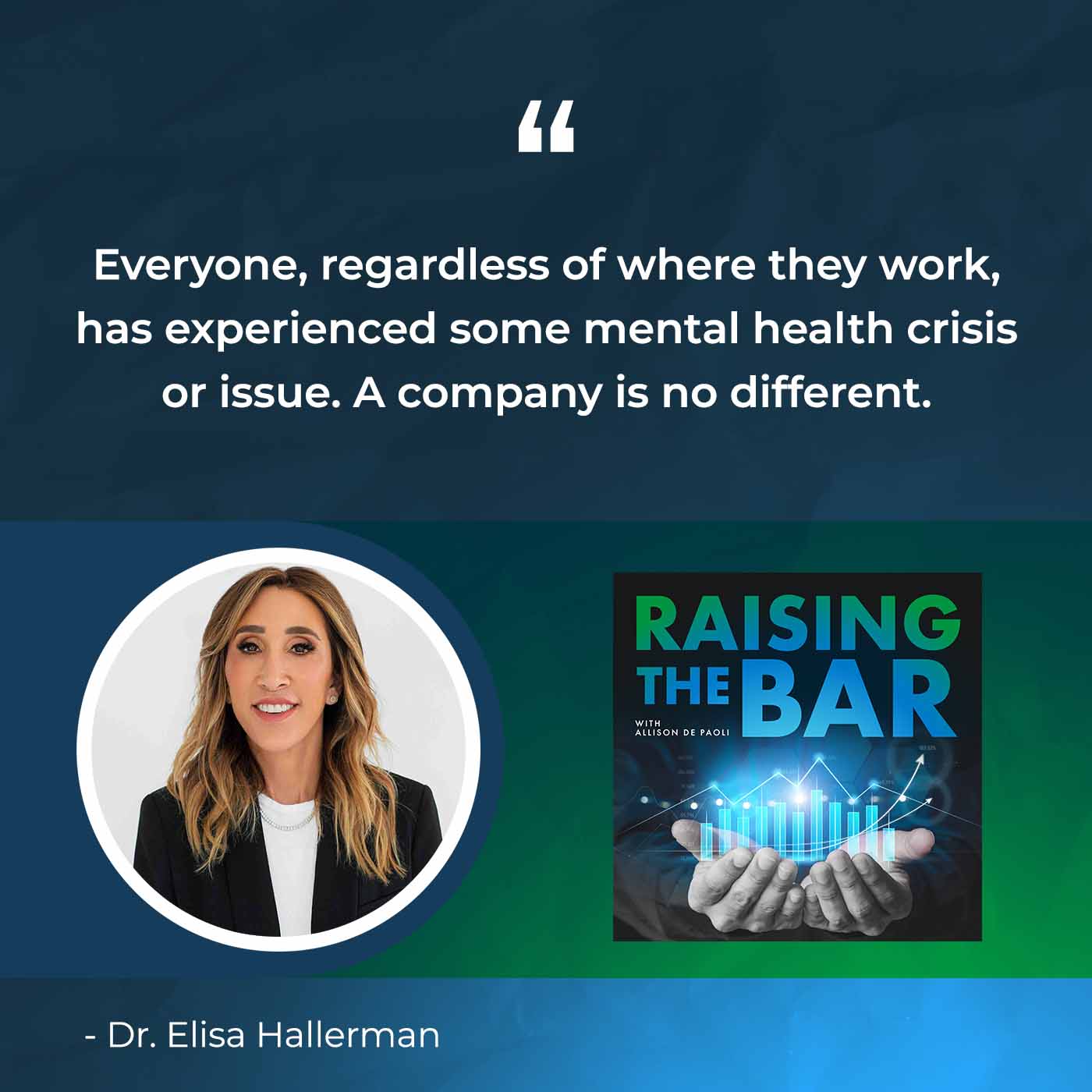
That’s why it’s always about doing the assessments first to see what is going on underneath and where everybody is in their state of change because we’re not looking to change anything. We’re looking to transform. What I like to say is that we’re looking to grow down. We’re not looking to change what’s working. We’re looking to create more depth in what it is that you are doing and caring for the other human beings and the people that are working at the company. Otherwise, you are losing a tremendous amount of money.
I’m in the health insurance space. For our best and highest performing clients, I always get some version of, “We spend a lot of money. If we can spend less, great, but that’s not the point. Could we help the humans?” I think a lot of employers are very concerned about their employees, staff, teams, people, or whatever it is that you want to call them. They are very concerned, but they do not know what to do or how to do it. If you say, “You need to heal everybody,” that’s too much. We have to do different conversations. How do you guide that conversation?
It’s very specific as to what they are already doing. Some companies will already have some wellness protocol, but what I notice is that doesn’t in include behavioral health. That’s an important piece. What do they already have in place and what are they missing? If it’s a large company and there’s HR, they have certain protocols already in place where they have programs and they call a number. When you call an EAP, or you call a number and you’re given X amount of sessions, let’s say five sessions, what’s happening is you’re calling a company, you’re speaking to whoever’s answering the phone, and they’re saying, “We’re going to connect you with Dr. Sally or Jim, and they’re going to be right for you.”
They know nothing about the company and the kind of personality of the people that work there. Each company is going to be so unique and specific. Just speaking about the entertainment business alone and working with those companies as opposed to maybe working with a Wall Street company. It’s a different set of personalities. I’m not going to suggest maybe the same type of therapist or the same kind of treatment, or even the same lecture or education that I’m going to give this company. What we do is so specific, not only in working with families and individuals but with companies in the same exact way.
How do you ensure that the message is delivered throughout the company? You mentioned earlier that your largest client is about 8,000 employees. I often think that employee communication is like the game of telephone when you were a child. What somebody says here comes out completely different on the other end. How do you manage that process?
At some of the larger companies, it’s everything from rewriting the copy of how the email is going to go out to the entire company or delivering an important piece of information, what that copy is going to look like, are there any trigger words, is this the right language. We’re explaining it. Not just doing it for them but teaching them this is why. It can be as small as that to figure out who are the superstars. Not just those people that have these leadership roles. Whether they’re that partner or they’re getting paid in that, who are those leaders that people gravitate towards and that they want to listen to? Let’s start with some people. Let’s also understand what is going on.
We’ll do a cross-section of interviews throughout the company to understand what’s going on throughout the company. We’re not going to sit down with 8,000 people, but we’re going to do a cross-section and understand what’s going on and do a thorough evaluation. Be able to come back and say, “Here’s what we’ve learned. Here’s where we are. Here’s where we need to get to. Here’s how we think we can get there.”
You can help monitor the progress along the way?
Yeah, completely. We’ll set up a year-long, “This is how we’re going to roll it out.” A year-long engagement with a company, if need be.
I see a lot of issues where an employee is not coming to work or there’s a lot of presenteeism because there’s an issue in the family. How do you address those kinds of things from a corporate level? If I work for you and you see that all of a sudden there’s a huge change in my performance and you suspect that there’s something going on, I have a sick family member, there’s some financial stress. What have you found are the most effective ways to address that that can accommodate an HR policy as well as accommodate the human?
It’s tricky at different companies. I find that they need a third party. The companies that we work with will often call and say, “We’re worried about Bob. This is what’s showing up. What should we do?” Usually, my advice is somewhere in the reign of, “Have a conversation. Have HR present and offer Bob a solution where you’re like, ‘We’re concerned. We’re worried. We don’t know what to do. This is not our role, but we appreciate you. We respect you. We want to do what we can. We would like to offer you that we will work with RMA. We will hire them to do X amount of sessions or put something together, and we want to offer you a solution. Here’s the phone number. Call her. It’ll be strictly private.’”
That’s one way that we work well with companies because, with HR, it is tricky. If not my company, there needs to be someone that’s a third party that’s brought in that they can say, “We’re willing to pay for this, but we’re going to let them decide with you what’s appropriate or what you need.” I think it’s the best way to go. It shows that they care, they’re concerned, and they’re willing to take on some of the financial pieces of it, but they’re also giving the employee autonomy to decide what they want to do.
It’s like in a family system, the parents have to be willing to have boundaries and consequences. The parents can’t tell their 19-year-old or 35-year-old kid that this is what they have to do because they’re over the age of 18. They can certainly say, “Here’s what we’re willing to do and participate and be there for you financially and emotionally support you, and here’s what we’re not willing to do.”
I think your business is growing quite rapidly, and more people are finding their way to you. Are there any consistent themes that you see that people come to you for?
What I’ve noticed the most over the last couple of years since the pandemic is the rate of depression and suicidal ideation. That is like nothing I’ve ever seen. The fact that suicide is a very real choice for so many people is devastating. The mental health system is so broken. Getting someone help who is suicidal is almost impossible at times in certain states. Even with the increase in suicidal awareness or 988, the actual treatment on the other end of that is not accessible. We don’t have mental health facilities in the way that we used to. We have a lot of substance abuse and co-occurring treatment centers.
[bctt tweet=”The fact that suicide is a very real choice for so many people is devastating. The mental health system is so broken.” username=””]
If someone is experiencing psychosis, suicidal, or homicidal thoughts to be able to get them into a mental health facility, there are very few beds in the hospitals that we have. We went through a period where we closed a lot of those facilities. There’s literally nowhere to put them. Because it’s such a big problem, being able to intervene and having early, I think this is where companies can come in as we saw this progression of depression and anxiety. Even going back, I remember when the #MeToo had started, and companies were coming with, “What do we do about this?” I was like, “Wouldn’t it have been nice?” None of these were complete shocks. Maybe some, but most, there were red flags that we were painting white along the way and looking the other way.
If we could get ahead of the depression and anxiety and if we could make it a place where they felt comfortable saying, “Is there someone I can call? Is there something I can do?” We can offer that and get ahead of it a little before it becomes a crisis. If their kid is having a crisis, they can call the company that they worked at for 30 years every day and say, “Whom do I call?” You can have on-hand some real places. That’s an incredible gift and not that hard to have some tangible resources that are not just online but, “Can I have someone to speak to for an hour and get clarity?”
I’ve seen organizations that never stopped working. They worked right on through the pandemic and kept right on going and didn’t miss a work beat. The people missed a lot of beats, but the work kept going. I still have clients that everybody is now remote, and they’re all seemingly quite happy. Do you feel that the stigma of mental health issues is relaxing a little bit? Looking from the outside, I always feel that there are no good resources for people when there’s maybe a small ideation or a concern about a family member until there’s a full-blown crisis. It’s almost like when you go to jail. At this point, if you go to jail, your life is pretty much over. Is that relaxing a little bit? Is the stigma going away a little bit?
Maybe a little bit, but it’s still not a comfortable topic to be certainly in the workplace where people feel they can share with their colleagues or certainly their bosses or even HR. We haven’t gotten there yet, for sure.
I don’t. We certainly haven’t here in Texas, but we’re our own country here.
I live in LA. Maybe in LA, it’s a little bit more accepting, but I’d say for the majority, it’s incredibly difficult.
I see more than ever before mistrust in the workplace. Maybe I’m naïve, or I never looked at it the right way, but I used to see a lot of workplaces that were relatively peaceable, people got along, and people weren’t actively thinking that somebody was working against them. I’m not talking about paranoia, but there seems to be a lot more conflict in the workplace and a lot more distrust among levels of people. Not just, “That’s the man.” It seems to be coming the other way as well. That seems to be a little different than it was a few years ago. Are you encountering that?
What that looks like to me is unresolved trauma, stress, and toxic stress. When we’re in a fight or flight, when we’re triggered, then we’re going to go into this. It’s either me or you, and that is a very reptilian old-brain reaction to survival. Most people’s window of tolerance of what they can endure is getting smaller because of the stress that they’re under and because of the trauma that either individually has happened to them in the last couple of years, or just what’s happening in the world.
If we’re not working on that and if we’re not healing that, then everyone’s window of tolerance is getting smaller. Everyone’s ability to self-regulate is getting shorter. Everybody is in the survival of fight or flight or “This is mine and that is yours. I need to protect it at all costs.” The way that manifests itself is in this backstabbing, unsupportive, dishonest culture. It’s not even about the culture, it’s about the trauma.
[bctt tweet=”If we’re not working on our trauma and we’re not healing, then everyone’s window of tolerance is getting smaller. Everyone’s ability to self-regulate is getting shorter. Everybody is in fight or flight mode.” username=””]
If I’m an individual and I go to work every day, how do I regulate myself in that environment? If I am a leader, not a C-suite leader or a mid-level leader, that kind of mid-level, low senior-level leader because those are the operational people, what is a good framework for thinking about how to manage that on a lowkey basis? Maybe that’s too broad a question, but resources are hard sometimes, and not everybody is going to have access to a full team of people that can help with that, but the problem still exists.
It is broad, but if we’re just looking at some selective things that everybody could do, I think it’s about identifying when someone is in a trauma response or when someone seems to be suffering from physical signs of maybe addiction, a mental health crisis, or trauma. They might have a lack of concentration, excessively sweating, talk quickly, feel dissociated, or not be paying attention in the same way. They might be very forgetful of something that was told to them last week. They might be inconsistent in the way that they’re irritable, having a mood swing, or isolating a little bit more when you don’t see them with the traditional crowd that they run with.
Being able to notice not what people say but what people do. If someone is elevated, “Let’s take ten minutes, go back to our offices, settle, and come back and have this conversation,” or “Let’s wait 24 hours and have this conversation tomorrow.” It’s giving some space. When I talk about window of tolerance, that is a word that Dan Siegel speaks about when he is talking about trauma and what happens in our bodies.
Our bodies are meant to self-regulate. Something will happen, and we’ll have this moment where maybe we’re walking on the sidewalk, and we see a garden hose and we jump because we think it’s a snake. That is the survival part of our brain. Very quickly, the front part of our brain, the cognitive thought process, our impulse control, and rational thinking comes online and go, “No, we’ve seen that before. That’s a garden hose. We’re fine.” Our bodies go up in this elevation, and then they come back down.
When something happens that’s outside of that window of tolerance where it’s too extreme, where we can’t compute what’s happening, or there’s been chronic trauma. You have a narcissistic boss that is saying certain things, and you come from a family of emotional and physical abuse. That’s going to land much higher on how you feel it than it might for your coworker. For everybody to be cognizant about what these signs look like when someone’s activated, dissociated, or having symptoms of withdrawal or drug use or whatever, that is something that as long as you can notice in real time and shut that down in the moment, that’s helpful.
Retreat and come back to do it again another day.
Give it some space or bring someone else in the room to maybe make them feel safe. People that are traumatized don’t feel safe in their surroundings. Their immediate reaction is, “I’m going to fight back. I have to get out of here.” When we see that kind of response, maybe take a little bit of time or bring in a third party that they are going to feel comfortable into the room and it doesn’t feel like an attack. Create a safer space. Maybe get out of the office environment and take a walk around the block to have a conversation.
[bctt tweet=”Create a safer space. Get out of the office environment and take a walk around the block to have a conversation.” username=””]
Before we wrap up, one thing that I have been reading about is that trauma is cumulative. There may be things that happened in the past, and something will trigger it in the present, even though it doesn’t seem that serious a thing. Is that a correct assessment?
When someone is experiencing trauma symptoms, there are three different kinds of trauma. There’s an acute trauma, which is an accident or an assault, a one-time event. Things that we think of as traumatic mostly. There’s chronic trauma, which is ongoing. Someone being bullied at school, someone working for a boss that is consistently triggering them, or going through a divorce over a period of a year. It’s ongoing things that are going on and on that are building up to the same amount of trauma as an acute event would. There’s complex trauma, which would be a combination of both, and also a lot of underlying childhood trauma, attachment disorder stuff, and so on.
What happens is the way we define trauma is different from PTSD, it’s not about itself that happened whenever long ago, but it’s about how our body is responding to it in the present. Not being able to stay in the present because we’re experiencing the present moment as if we are still activated in that trauma response. It’s not able to move forward. What happens is something traumatic happens, and like I said, you want to go into fight or flight. What if you can’t? What if you’re frozen? What if you’re unable?
Two things happen. One is all that energy, and all that adrenaline and cortisol that gets immediately pumped through your body gets held on a cellular level that we haven’t been able to disperse. That will manifest itself as anxiety, OCD behavior, phonetic energy, or shutdown. That’s what’s happening in our bodies. What’s happening in our brains is that when something traumatic happens, we’re unable to integrate that experience.
You’ll hear people talk about they were in a car accident and things slowed down. When they’re talking about something that had happened to them that was traumatic, bits and pieces that don’t make sense, like when you talk about a dream the next morning. That’s because everything can’t get integrated because your brain only understands something that’s happened before. All of a sudden, something outside of our realm of understanding a sudden death, you’re like, “Wait, what?” You can’t understand what’s happening. Your memories don’t get integrated, so you lose a sense of time.
It’s happening to you on a neurological level, and it’s happening to you on a physiological level. That trauma and energy do get coupled on top of each other until you start to heal what’s happened. The good news about trauma is that it can be healed. Unlike some mental health issues, mental illness, or substance abuse, which requires abstinent, medication, or therapy and ongoing, you can release and heal a lot of your trauma.
We will leave it there. That was very good advice for very many people, including those that think they’re not traumatized. No judgment there. Thank you very much.
No room for judgment.
Also, very good advice. Thank you for joining me. For those of you that are tuning in, thank you very much for tuning in. If you like the show, leave us a review and subscribe wherever you’re tuning in to this. Help us spread the word. We will see you next time. Thanks so much.
Thank you.
Important Links
About Dr. Elisa Hallerman, PhD, JD
 Dr. Elisa Hallerman, PhD, JD, has had a diverse career over the past 25 years. Dr. Hallerman is an attorney and member of the New York State Bar Association. She holds a master’s and doctorate from Pacifica Graduate Institute in Depth Psychology and Somatic Studies, focusing on neuroscience and trauma. Dr. Hallerman is also a drug and alcohol counselor, and certified in yogic science for addictive behavior. In addition, she is a member of the Institute for Functional Medicine. She is also the author of a brand new prescriptive memoir SOULBRIETY: A Plan to Heal Your Trauma, Overcome Addiction and Reconnect with Your Soul.
Dr. Elisa Hallerman, PhD, JD, has had a diverse career over the past 25 years. Dr. Hallerman is an attorney and member of the New York State Bar Association. She holds a master’s and doctorate from Pacifica Graduate Institute in Depth Psychology and Somatic Studies, focusing on neuroscience and trauma. Dr. Hallerman is also a drug and alcohol counselor, and certified in yogic science for addictive behavior. In addition, she is a member of the Institute for Functional Medicine. She is also the author of a brand new prescriptive memoir SOULBRIETY: A Plan to Heal Your Trauma, Overcome Addiction and Reconnect with Your Soul.

